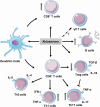Aldosterone, Inflammation, Immune System, and Hypertension
- PMID: 32820797
- PMCID: PMC7891246
- DOI: 10.1093/ajh/hpaa137
Aldosterone, Inflammation, Immune System, and Hypertension
Abstract
Aldosterone is a mineralocorticoid hormone that controls body fluid and electrolyte balance. Excess aldosterone is associated with cardiovascular and metabolic diseases. Inflammation plays a critical role on vascular damage promoted by aldosterone and aggravates vascular abnormalities, including endothelial dysfunction, vascular remodeling, fibrosis and oxidative stress, and other manifestations of end-organ damage that are associated with hypertension, other forms of cardiovascular disease, and diabetes mellitus and the metabolic syndrome. Over the past few years, many studies have consistently shown that aldosterone activates cells of the innate and adaptive immune systems. Macrophages and T cells accumulate in the kidneys, heart, and vasculature in response to aldosterone, and infiltration of immune cells contributes to end-organ damage in cardiovascular and metabolic diseases. Aldosterone activates various subsets of innate immune cells such as dendritic cells and monocytes/macrophages, as well as adaptive immune cells such as T lymphocytes, and, by activation of mineralocorticoid receptors stimulates proinflammatory transcription factors and the production of adhesion molecules and inflammatory cytokines and chemokines. This review will briefly highlight some of the studies on the involvement of aldosterone in activation of innate and adaptive immune cells and its impact on the cardiovascular system. Since aldosterone plays a key role in many cardiovascular and metabolic diseases, these data will open up promising perspectives for the identification of novel biomarkers and therapeutic targets for prevention and treatment of diseases associated with increased levels of aldosterone, such as arterial hypertension, obesity, the metabolic syndrome, and heart failure.
Keywords: adaptive immune response; blood pressure; dendritic cells; hypertension; inflammation; innate immune response; lymphocytes; mineralocorticoid receptor; monocytes/macrophages.
© The Author(s) 2020. Published by Oxford University Press on behalf of American Journal of Hypertension, Ltd.
Figures




References
-
- Tait JF, Simpson SA, Grundy HM. The effect of adrenal extract on mineral metabolism. Lancet 1952; 1:122–124. - PubMed
-
- Hobbiger F, Simpson SA, Tait JF. The hydrolysis of cortisone acetate by enzymes of human blood. Biochem J 1954; 58 (330th Meeting):X. - PubMed
-
- Simpson SA, Tait JF, Wettstein A, Neher R, Von Euw J, Schindler O, Reichstein T. [Constitution of aldosterone, a new mineralocorticoid]. Experientia 1954; 10:132–133. - PubMed
-
- Speirs RS, Simpson SA, Tait JF. Certain biological activities of crystalline electrocortin. Endocrinology 1954; 55:233–236. - PubMed
Publication types
MeSH terms
Substances
Grants and funding
LinkOut - more resources
Full Text Sources
Medical
Miscellaneous

